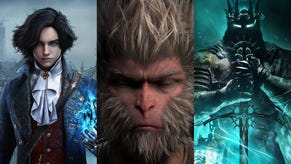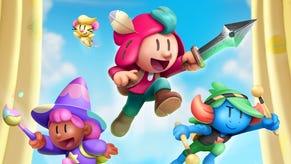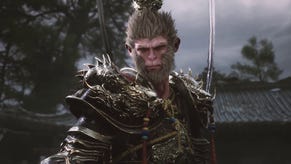Black Myth: Wukong is a brilliant boss rush, but is it a Soulslike?
Chimp off the old block.
Ever since its reveal in 2020, fans have wondered if Black Myth: Wukong is truly a Soulslike. In part that's due to the Soulsborne games overshadowing any and all action games these days, but the precise combat, elaborate bosses, and seemingly high difficulty of Wukong certainly looked to be aping FromSoftware.
Now I've had a proper hands-on preview of the game, beyond a relatively brief time at Gamescom last year, and I can tell you Wukong is not (really) a Soulslike.
That does, of course, depend on your definition of a Soulslike. It certainly has many of the hallmarks. Combat is all strikes and dodges managed with a stamina bar. Shrines are checkpoints to restore your health. And if you die you lose some experience, with enemies magically respawning too. Then again, you can also pause the game.
The game's Chinese developer Game Science, though, doesn't consider it a Soulslike, instead preferring the more generic term "action-RPG". "In this game you can see there are a lot of spells and transformations," a spokesperson from the studio told me, adding combat is varied for players to "create their own combos and to find their own style". "This is a level of freedom we want to give to our players."
That said, I wouldn't expect the variety of character builds the Souls games offer. While experience gained in Wukong can be spent on a branching skill tree to expand combat options, it doesn't appear to have the diversity of character customisation FromSoftware is known for.
There are two other key elements, the developer cites, that differ from Soulslikes: narrative and difficulty.
The game is based on the classic Chinese novel Journey to the West, first published in the 16th century during the Ming dynasty. It's an exceptionally long story, with Sun Wukong - often known as the Monkey King - as one of its most prominent characters. It's also proven immensely influential, spawning multiple TV adaptations, as well as inspiring Ninja Theory's Enslaved: Odyssey to the West and, perhaps most famously, Akira Toriyama's Dragon Ball manga.
Black Myth: Wukong is actually a story that takes place after Journey to the West, though it retains its characters. "We keep the character relationships and we create these battle scenes where Wukong fights against the Yaoguai [boss enemies] to help people immerse into this amazing world," said a Game Science spokesperson.
As such, the team has been quite free with the source material, but there's a clear narrative thread throughout the game rather than the subtle lore drops of FromSoftware's work. Indeed the section I played, a couple of hours into the game, featured beautiful cinematics introducing new environments and bosses to set up the plot, though at this point it was hard to grasp too much narrative detail. "There isn't much story going on in the first chapter, however we are still working on it to adjust the cadence of the story," said a Game Science spokesperson. "In this whole game, we are intentional to tell a complete story not only about the battles but also about the characters. We pour our heart into building characters with life and blood and after playing the game we wanted players to feel not how strong they are, but how related they are to the main character's experience."
.png?width=690&quality=75&format=jpg&auto=webp)
.png?width=690&quality=75&format=jpg&auto=webp)
As for difficulty, the game is certainly challenging but this particular preview build didn't put up too much of a fight. Still, Game Science isn't necessarily aiming for Black Myth: Wukong to be ultra hard.
"A lot of people find action games very frustrating due to the difficulty," said a Game Science spokesperson. "It's not because they don't know how to play, it's because they can't keep up with the rhythm of the game. So we are trying to ease that problem for the players who want to experience the story and who want to experience the battles by providing them the different kinds of spells and transformations and also to make the game less punishing, to help them enjoy the game."
Over the course of the game, players will acquire a number of transformations to use during battle. One of these was a fiery wolf form - more formally, the Red Tides spell - that provided a whole new moveset with powerful flaming attacks. I acquired this by defeating an optional boss, named Guangzhi, meaning fully exploring should prove fruitful. What's more, these transformations have their own life bar, so not only add new abilities but essentially provide an extra life too.
The immobilise spell, however, proved most useful. I'd almost say it's overpowered: it literally holds enemies still for a few precious seconds to smack them uninterrupted. But it acts on a cooldown, meaning I was able to time my usage accordingly to allow for a refresh before using again. Cheesing a boss fight? I'll let you decide if that counts, but at least some Soulslike strategies work!
.png?width=690&quality=75&format=jpg&auto=webp)
Where the game falters, and where it's most obviously not a Soulslike, is in its level design. From Dark Souls onwards, FromSoftware has truly innovated in this area - Lordran especially is an intricate labyrinthine puzzle box that twists and folds back on itself in surprising ways, which has become characteristic of the Soulslike genre. Elden Ring, meanwhile, stretches this into an open world with vast fields leading to serpentine dungeons.
Wukong is neither of these. Instead, progression is predominantly linear: a series of forest pathways leading to wide arenas with, at least in this preview, little reason to backtrack. Some areas are broader and there are optional bosses roaming around - one particular giant-headed enemy admittedly proved too tough at this early stage, so I ran past after a couple of attempts - but for the most part, there's a singular route through the game. "It's a linear game propelled by the storyline," confirmed a Game Science spokesperson. "In some of the levels the map is much, much bigger than what you just had, however we won't say we're an open world game."
Between boss fights, then, Wukong feels a little empty. A smattering of repeated smaller enemies chased me, but I soon realised most could be easily dispatched with just one charged attack. There are materials to collect, presumably for gear upgrades or item creation, and at one point the monkey protagonist morphed into a cicada to fly past enemies, though this was a one-time deal rather than any form of transformational puzzle. At the least, the environments are among the most beautiful I've ever seen: bamboo forest groves, secret waterfalls, and rabbits hopping through lush undergrowth, with softly realistic lighting and detailed textures. Game Science has transformed itself from predominantly mobile developers to Unreal Engine 5 wizards.
.png?width=690&quality=75&format=jpg&auto=webp)
And then come the bosses, or Yaoguai. While I'm unable to name them for spoiler reasons, Wukong offers an exciting menagerie of large opponents, from masters of battle, to giant wolves, fierce nobles, and more. Here Wukong is a triumph: one-on-one fights with elegance and style, mixing Wuxia and martial arts influences. It's there in the cinematic setup as bosses boast of their power; the way the monkey holds out his staff as opponents circle one another; the way water ripples and leaves flutter with every spin and twirl of movement. It's as balletic as it is tense and I left each battle with sweaty palms and heart pounding. It may not be a true Soulslike, but it certainly offers familiar thrills.
Much of this praise has been overshadowed by reports of misogyny at Game Science, following social posts from the studio's CEO and other developers. It's something Eurogamer has reported on, along with IGN, and other sites, but at this preview Game Science was unable to answer my questions on this topic. Rest assured I have followed up and will report once we have a response.
There's another shadow looming over Wukong too, that of Elden Ring's Shadow of the Erdtree DLC. Its recent release is set to dominate over the summer, ahead of Wukong's August release. Then again, Wukong is currently Steam's most wishlisted game. Game Science is far from worried.
"In our company, a lot of our colleagues love Elden ring. A lot of them love a lot of ARPG games. And the problem is they like playing games too much and not love their job enough," said a Game Science spokesperson. "However, we believe that the RPG market is very inclusive, and it's huge. And it can accommodate more games. We believe this kind of competition is healthy and we are confident with this competition."
These impressions are based on a demo build and do not reflect final game features.
.png?width=690&quality=75&format=jpg&auto=webp)








